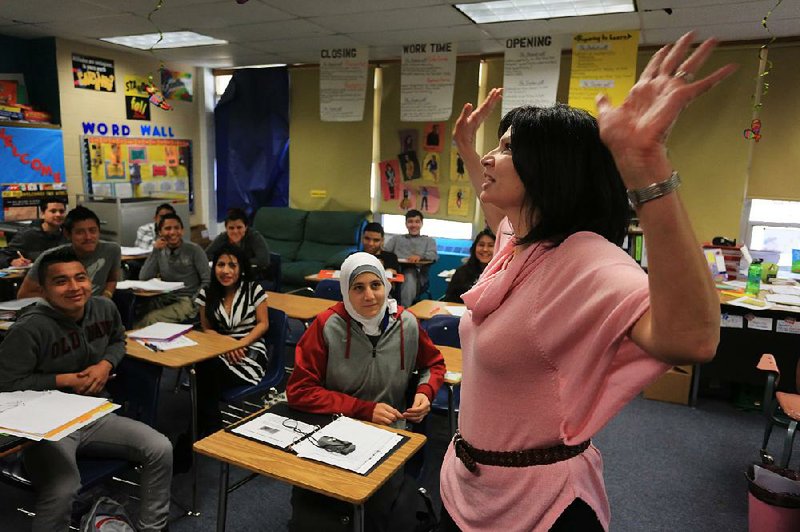Lily Eskelsen Garcia, the president of the National Education Association, said Monday that the federal No Child Left Behind Act of 2002 has "doomed" students -- primarily those who are poor and members of minority groups -- to schools that are "testing factories."
"For millions of students, the purpose of school is to hit your number," said Garcia, who called for Congress to change the law in her speech Monday to almost 200 people at the Clinton School of Public Service in Little Rock.
Garcia said the act, which requires every state to test students in math and literacy and penalizes schools that do not meet annually escalating achievement goals, is the "most absurd bipartisan mistake Congress ever made." She repeatedly referred to the law as "no child left untested."
Little Rock -- where the state Board of Education last week removed the elected School Board and placed the superintendent under the direction of the state education commissioner on an interim basis -- is experiencing the fallout from the law, Garcia said.
The state takeover of the 24,800-student district was based largely on a lack of satisfactory achievement gains in six schools labeled as being in academic distress, meaning that fewer than half of the students in those schools scored at proficient levels on state-mandated Benchmark and End-of-Course exams in math and literacy in a three-year period.
"You are experiencing what can happen when you don't hit your quota of kids that hit the test scores on standardized tests," said the former food-service worker and elementary school teacher.
"We don't want to pretend that we don't have problems in many of our schools," Garcia said. "We are struggling to find answers so that our students can succeed. But school takeovers and calling in experts or outsiders who don't know your children will not solve the problem."
She said takeovers in other places typically "give the illusion" that something is being done. She said people are brought in at great cost to the state-controlled school system and work for five or six years. "Then they leave and nothing has changed," she said.
Garcia suggested that state policymakers look at the lessons learned by Arkansas' Heifer International, which works to end poverty in communities around the world. "The answers don't come easy, there is not a silver bullet, but the answers have to come from the community," she said.
She also said that as Congress looks at reauthorizing the No Child Left Behind Act, which began as the Elementary and Secondary Education Act of 1965, there is an opportunity to "end this insane obsession of judging everything that goes on in a school on nothing more than a standardized test score that was designed to be one small indicator that would give us a little piece of information."
The law has to get away from a factory model of education with prescriptive rules and regulations and instead rely on communities coming together to set the goals for their children and schools, she said.
"Our children don't need another test. They need the legal, civil, and human right to a great public school, to have the opportunity to learn, and they need it right now," she said.
Paula Moreno, a senior at Little Rock's Parkview High School and a member of the newly formed Little Rock School District Student Association, asked Garcia what students' roles should be in the school-overhaul movement.
"You are the north star," Garcia said. "The students' voice is crucial. You are the walking, living truth. You just stand even taller, and say 'no one is making me do this. ... I'll not be silenced when someone is trying to cheat me out of my education.'"
Garcia became president of the 3 million-member union in September after serving as vice president and secretary-treasurer of the group. The union is the parent organization to the Arkansas Education Association of teachers and education support employees. Garcia began her career in education as a school food-service worker, earned a degree and taught elementary school in suburban Salt Lake City. She was the 1989 Utah Teacher of the Year and was president of the Utah Education Association for 10 years. She was her party's nominee for a congressional seat in 1998.
Before her speech, Garcia spent the morning at Little Rock's Forest Heights Academy for kindergarten through eighth grades and at Hall High School, a "Newcomer Center" for non-native English-language learners and one of the district's academically distressed schools. She asked students -- sometimes in Spanish -- to identify the needs of their schools so she could convey them to President Barack Obama in a White House meeting next week.
"More books for those who are learning to speak English," responded Sarah Alwan, a Hall High student who is Palestinian.
Mariela Mejia, who came to the United States from El Salvador, asked for more science equipment for laboratory experiments. Others suggested fields for soccer along with more music and vocational programs.
"More classes like this," said a student in Beatriz Varela's English as a second language class at Hall High.
Varela told Garcia she needs more reading books that are a low level of difficulty but are of interest to teenagers so her students can practice their new English skills at tutoring sessions in the mornings before classes start.
The teacher association leader praised Forest Heights, saying that the newly reconfigured school with its emphasis on science, technology, engineering and math and inclusion of a band and other arts programs was a kind of school that the most affluent parents in a community would be glad to have their children attend.
"In the state of Arkansas, what do the most affluent neighborhoods have in terms of programs and services and facilities?" Garcia asked. "That is your best. How does that line up with your poorest neighborhood? That will really tell us if you are giving all kids the opportunity to learn."
Metro on 02/03/2015

